I sometimes
wonder why fishing in Britain doesn't get more of a fair shake in the PR stakes
when it comes to the sports and pastimes on our nation. You have to ask, is
that down to us?
|
|
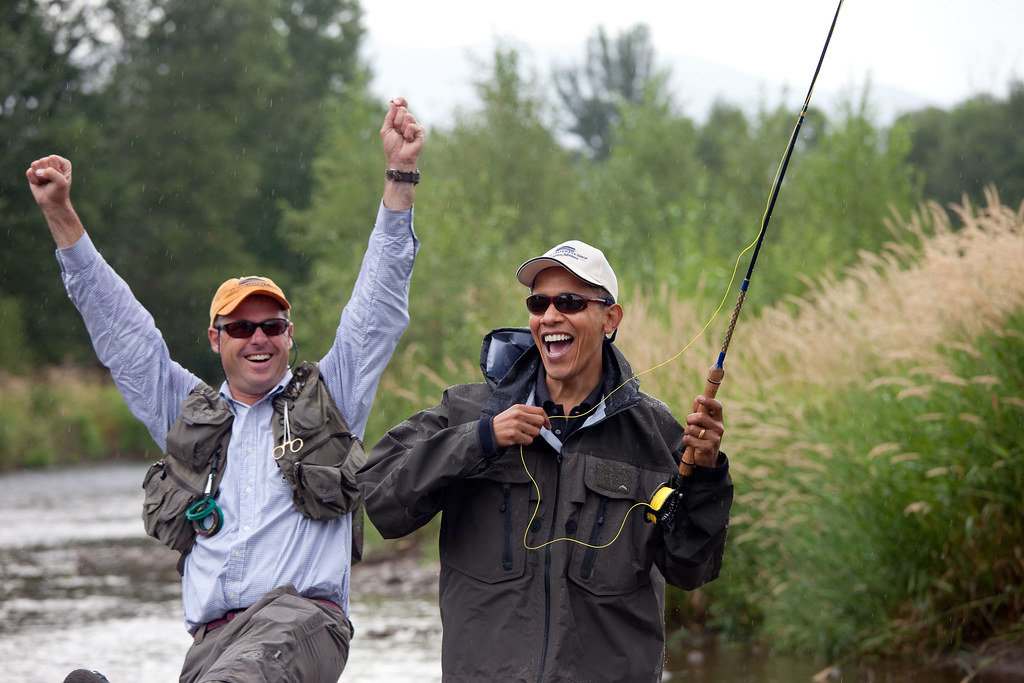 |
|
|
President Obama with a very excitable Dan
Vermillion of Sweetwater Travel (US tour agents for Fishing Breaks) in
Montana 2009
|
Last week
we saw the hunters and fishers of the state of Michigan taking to the streets
for the right to bear rods and arms. Now, you might well think in the current
climate their passion is misdirected, but you can't argue with the passion.
Maybe it speaks to a wider belief in the great outdoors that goes deeper in the
US than it does in Britain which applies as much, it seems, to our leaders as
us.
Believe or
not in the post-war era more US Presidents have fished on the River Test than
British Prime Ministers: George Bush Snr, Jimmy Carter and Dwight Eisenhower.
Eisenhower was truly passionate about fly fishing; in his time as President he
logged over forty fishing trips (mostly to Colorado) and taught Richard Nixon
to fly cast, all in between 800 rounds of golf, a number only bettered by
Barack Obama who took up fly fishing whilst in the White House.
|
|
 |
|
|
Fishing attire 1929 style
|
And the
British list? Well, it is hard enough to find much evidence of any fishing let
alone chalkstream fishing of recent incumbents. Of Boris Johnson I can find
nothing. On Theresa May, Gordon Brown, Tony Blair, John Major, Jim Callaghan,
Ted Heath and Harold Wilson I have drawn a similar blank. I did read somewhere
that Margaret Thatcher had one less-than-successful foray. David Cameron
married as he is into the Astor family who own a good beat on the Spey, I would
guess has had a flick or two.
In fact,
you have to go all the way back to 1964 to find a Prime Minster photographed
with rod in hand with Sir Alec Douglas-Hume who ended the continuous run of
Downing Street anglers of Harold Macmillan (keen on shooting and golf as well),
Anthony Eden, Winston Churchill and Neville Chamberlain. It was the last of
these who was the most accomplished. Chamberlain is probably best remembered
for his much derided 'peace in our time' photo op but a recent biography titled
Neville Chamberlain: Angler, Birdwatcher, Farmer, Prime Minister offers
a different side to him.
I was
surprised to discover Churchill as a regular, but probably not passionate, fly
fisher. He fished as a guest of hotelier Charles Ritz on the Normandy
chalkstreams, caught a 188lb marlin off the Californian coast conducting the
30-minute fight from a boat dressed in a three-piece suit, bow tie and smoking
a cigar. In 1943 when he travelled to address the US Congress, he and Roosevelt
snuck off to the secret Presidential retreat in Maryland to fish. He wrote of
the day,
|
|
 |
|
|
Menu signed by Jimmy Carter during his stay
in Hampshire in 1999
|
"On
Sunday the President wanted to fish in a stream which flowed through lovely
woods. He was placed with great care by the side of a pool and sought to entice
the nimble and wily fish. I tried for some time myself at other spots. No fish
were caught, but he seemed to enjoy it very much, and was in great spirits for
the rest of the day."
The naval
aide tasked with looking after the pair reported that they had no problem with
mosquitoes thanks to Churchill's cigar habit.
All sports
need not just champions but championing to catch the public eye. The magic
fairy dust of fame. Football has it in spades. Tennis, cricket, rugby, motor
racing and horse racing all get their annual place in the sun. But
fishing? The 3+ million of us who wander the banks seem untroubled by the
lack of attention.
Maybe that
is to our credit?
Snoods to
the rescue?
Today
should be One Fly Day. For obvious reasons it isn't. And for equally obvious
reasons you'll know why I have a cupboard full of branded One Fly Festival
giveaways. Hats. Shirts. Snoods. Snoods? Thought: maybe there is a PPE (bet
none of us knew what that stood for a month ago?) opportunity here? A full-face
Covid-19 mask that actually looks cool. As Del Boy would have said, we'll all
be millionaires by Christmas, Rodney. But perhaps not.
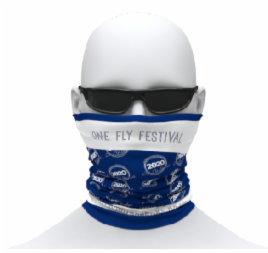 Face masks,
according to the US authorities, should be made from tightly woven cotton that
blocks the transmission of particles when you breathe or cough. Snoods, on the
other hand, are mostly made from more loosely woven man-made materials as they
are designed primarily for sun protection and ease of breathing.
Face masks,
according to the US authorities, should be made from tightly woven cotton that
blocks the transmission of particles when you breathe or cough. Snoods, on the
other hand, are mostly made from more loosely woven man-made materials as they
are designed primarily for sun protection and ease of breathing.
If you want
to know whether your snood can double as a face mask hold it up to a bright
light. The New York Times advises, "If light passes really easily through
the fibres and you can almost see the fibres, it's not a good fabric."
Sadly, it seems
most, if not all, fishing snoods will fail this test.
The
Educated Trout vs. The Educated Angler
From our
respective offices either side of the Hamphire/Wiltshire divide Charles and I
recorded Episode 5 of The Fishing Cast yesterday, courtesy of Zoom.
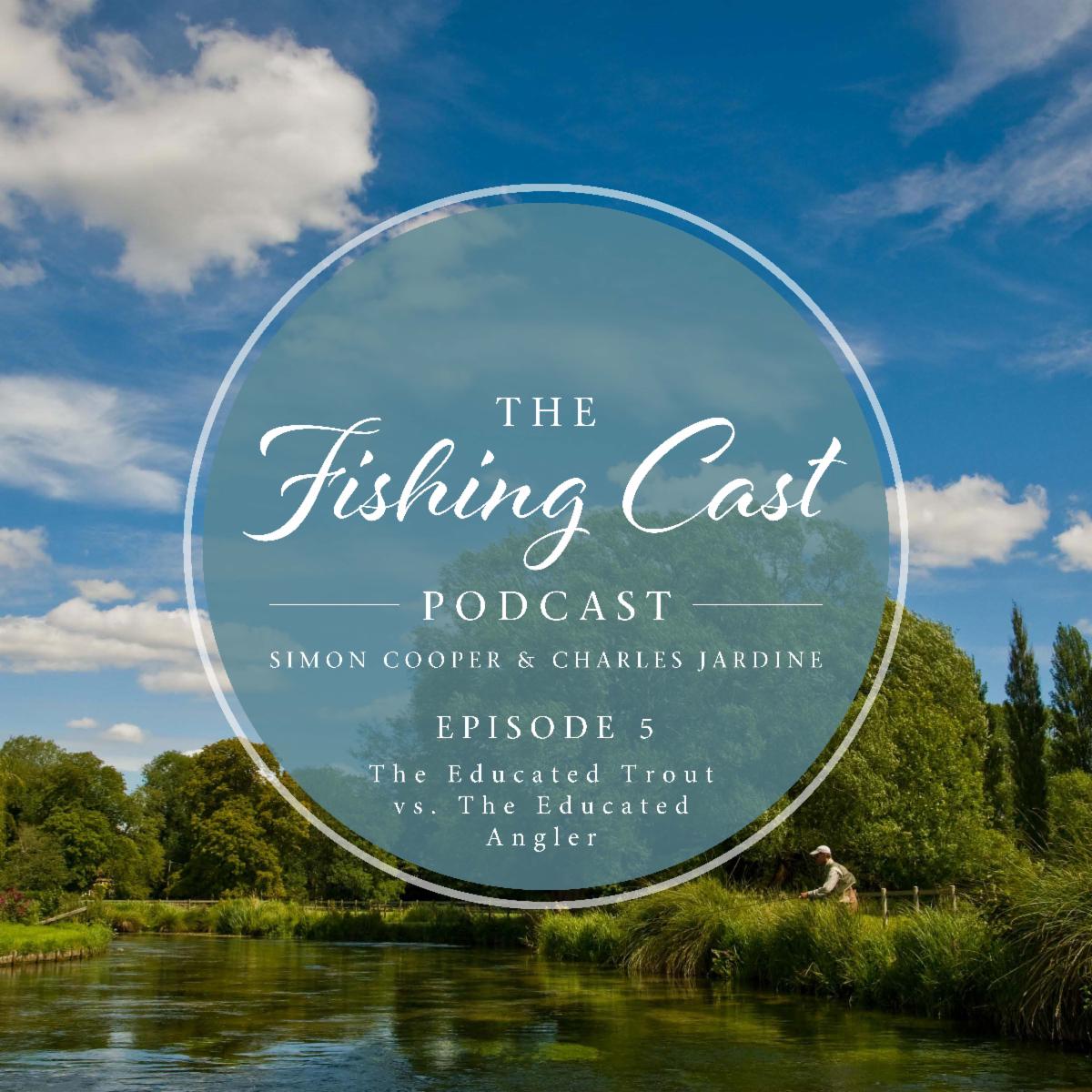 We discuss
the top 10 angling books of all time (bit of disagreement there), answer a
question on the best knots for tapered leaders and go back in time to review the BBC World About Us programme The Educated Trout.
We discuss
the top 10 angling books of all time (bit of disagreement there), answer a
question on the best knots for tapered leaders and go back in time to review the BBC World About Us programme The Educated Trout.
You can listen via your usual podcast provider or these
links:
Happy
listening!
PS Please
nominate your favourite fishing film, our topic next time. Email
us your selection(s).
Poison
ivy
Trees by
rivers can sometimes be very annoying. They grow for decades, even centuries,
until they choose to fall over at both unexpected and inconvenient moments.
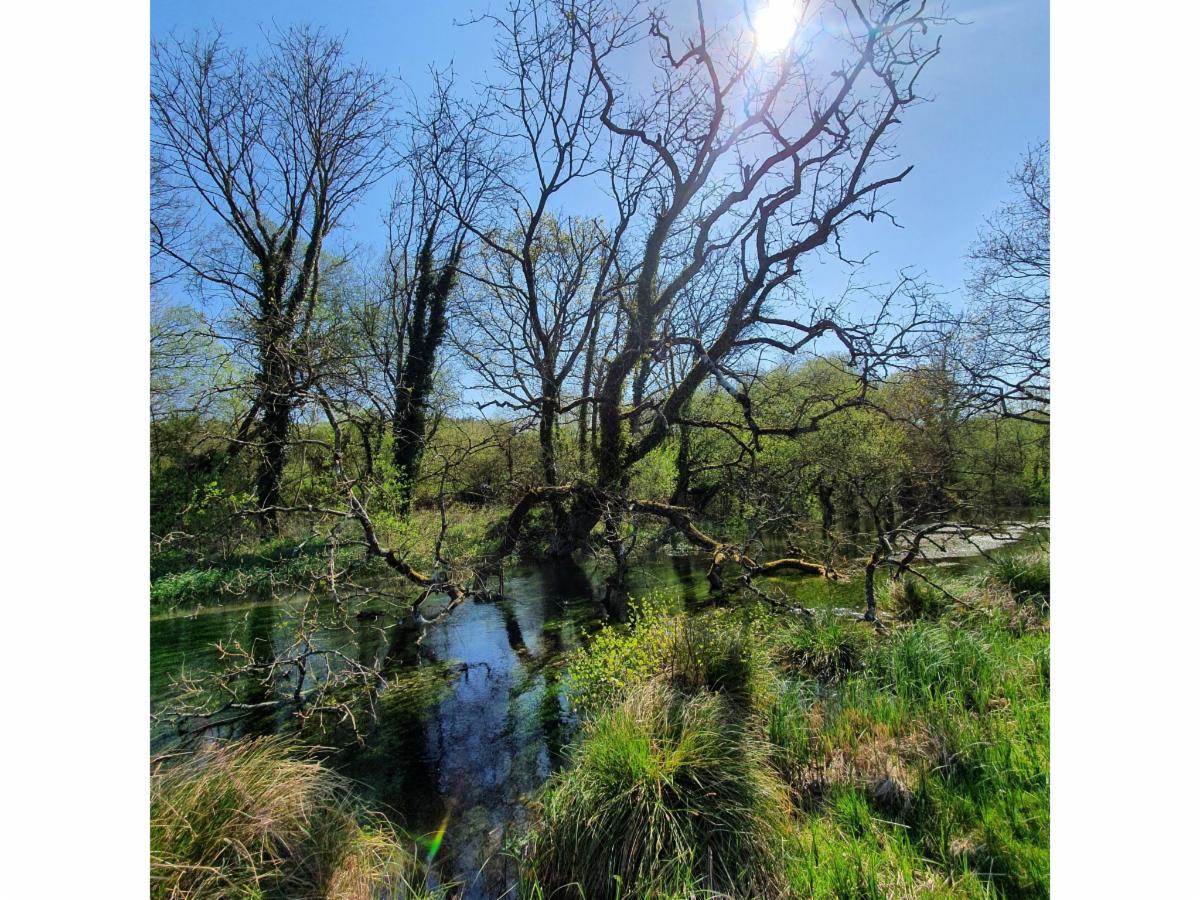 Typical is
this tree on Beat 3 at Bullington Manor. It is an ash, probably 75 years old,
that came down over the weekend. Why, you have to ask? There was no storm. No
special event. It is not even in full leaf, a common enough time in the life of
a tree to fall down. But fall it did. So, amongst the many spring tasks of a
river keeper this is one to add to the list.
Typical is
this tree on Beat 3 at Bullington Manor. It is an ash, probably 75 years old,
that came down over the weekend. Why, you have to ask? There was no storm. No
special event. It is not even in full leaf, a common enough time in the life of
a tree to fall down. But fall it did. So, amongst the many spring tasks of a
river keeper this is one to add to the list.
I posted
the photo on social media - I know exciting stuff - which prompted a French
follower to ask (all power to Google translate) why we hadn't stripped the tree
of ivy. Aside from the fact that we have hundreds of acres of woodland making
such a task impractical it did prompt me to do a bit of research on ivy.
It seems
ivy generally doesn't kill trees, but it does tend to target weak or dying
trees which sort of marries with my general observations over the years. Top
tip if you want to kill ivy: spray the leaves with vinegar. However, it does
have plenty of upsides for the local community. Butterflies harvest the nectar
in autumn. Birds eat the berries in winter. And small rodents use the dense
foliage as a safe and dry place to live.
Is it
poisonous? Well, not to them and only mildly for us. As for ivy on buildings
English Heritage conducted a three-year study which, surprisingly, concluded
there are many benefits but few detriments. Ivy cover acts both as an insulator
and protector from the elements; building walls with ivy were 16% warmer in
winter and 36% cooler in summer. That said, ivy roots will exacerbate any
existing damage or weaknesses of the structures on which it grows.
An
emerging mayfly
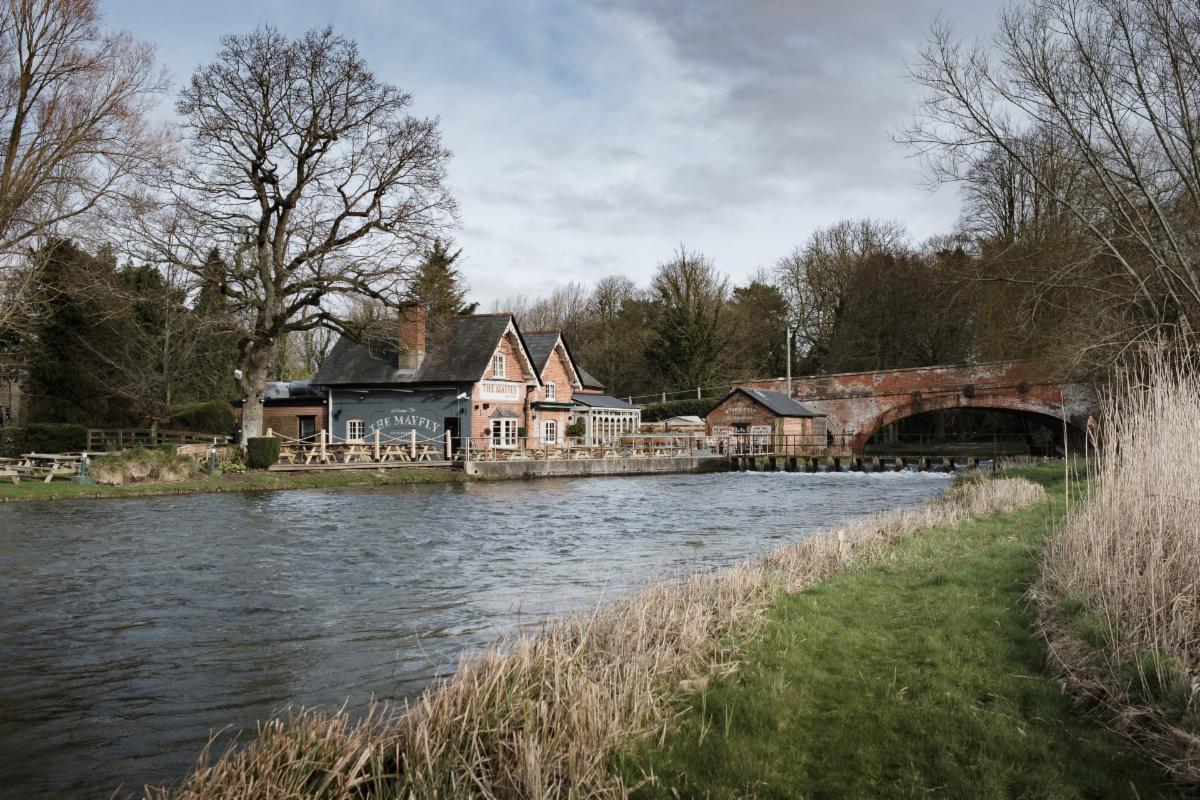 What is
missing from this scene? As the photo was taken on a spring evening over the
Easter weekend it must be people. And perhaps an angler or two.
What is
missing from this scene? As the photo was taken on a spring evening over the
Easter weekend it must be people. And perhaps an angler or two.
This is, of
course, The Mayfly Inn at Chilbolton just upstream of Stockbridge. Usually
every picnic table is jammed, the fish lining up beside the garden wall for a
steady stream of crisps. If I fished this beat, I'd be sure to tie up some
Kettle Chip deceivers.
It is a
glorious spot and a pub that has recently been refurbished under the new owner,
Fuller's Inns. They have done a grand job but only reopened a week ahead
of the Covid closedown but definitely one to put on the list when fishing
resumes.
 |
|
The private dining room at
The
Mayfly Inn
|
My kinda
gardening
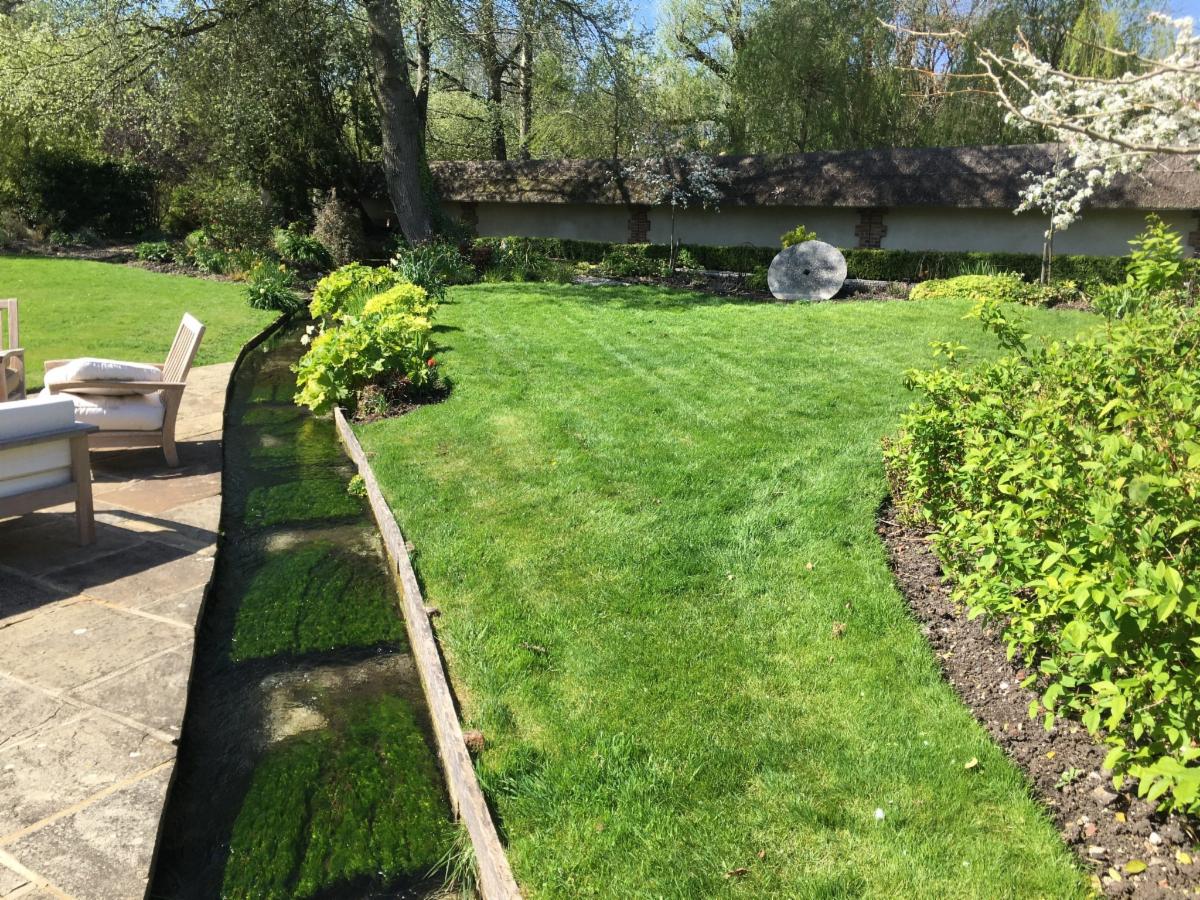 I confess:
I don't like gardening. I hear some people bewailing the continuing closure of
garden centres but I cannot empathsise.
I confess:
I don't like gardening. I hear some people bewailing the continuing closure of
garden centres but I cannot empathsise.
I feel the
pain of the growers who have had to turn millions of blooms into compost, but
truly garden centres are my most hated retail experience. And the actual act of
gardening comes a pretty close second.
However,
since I think trimming the weed in the back-garden stream here at The Mill
probably comes under 'non-essential' travel for our river keeper I took up the
scythe. Looks like I haven't forgotten how to do it.
Pretty
spiffy if I don't say so myself.
Quiz
I am
indebted to Fishing Breaks regular John Werrett who gave me these questions in
return for using some of mine in his village quiz. So, no particular theme this
week but as ever, it is
all just for fun with the answers at the bottom of the page.
1) What is a
Dorset Naga?
2) What did
Newcastle chemist William Owen invent in 1927 for those who were sick with
common illnesses?
3) What is the
only country with a coastline on both the Red Sea and the Persian Gulf?
Have a good
weekend.
Best
wishes,
Simon Cooper simon@fishingbreaks.co.uk
Founder & Managing Director
Answers:
1) A Chilli (formerly the world's
hottest)
2)
Lucozade
3)
Saudi
Arabia


 At one point I was considering removing the wheel altogether, but as it turns out bringing the mill wheel back to life was not as hard as I thought. There are still skilled millwrights to be found, so with a series of car jacks, a trip to the foundry for new bearings and a steel fabricator for the control gate the wheel was restored. Today it spins around merrily in the winter months, keeping my home and the village dry, though the grinding mechanism it once powered is long gone.
At one point I was considering removing the wheel altogether, but as it turns out bringing the mill wheel back to life was not as hard as I thought. There are still skilled millwrights to be found, so with a series of car jacks, a trip to the foundry for new bearings and a steel fabricator for the control gate the wheel was restored. Today it spins around merrily in the winter months, keeping my home and the village dry, though the grinding mechanism it once powered is long gone.









